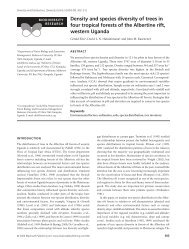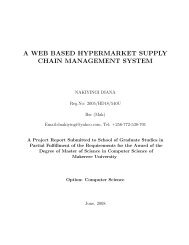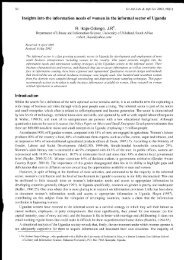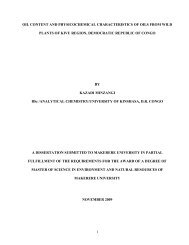THE UNIVERSITY OF LEIPZIG
THE UNIVERSITY OF LEIPZIG
THE UNIVERSITY OF LEIPZIG
Create successful ePaper yourself
Turn your PDF publications into a flip-book with our unique Google optimized e-Paper software.
the subsequent lack of general or socially acceptable validity in the claim. 213 It is about<br />
reasoning together over which solution should be sought and about developing and testing<br />
arguments concerning which preferences, norms or behavioural rules should be supported in<br />
the defined social setting among others. People seem to exhibit interest in both, using their<br />
environment as well as conserving it. Conservation initiatives may benefit from people who<br />
exhibit conservation interests. Thus, utility or willingness to pay forms the basis for individual<br />
rationality. On the other hand the ability of communities to follow existing institutions forms<br />
the core of social rationality. 214<br />
From the above analysis we observe that cooperation, trust and communicative action are<br />
paramount to institutional success. In short, we are talking about individuals as paramount<br />
institutional structures. Therefore, understanding individual behaviour is of essence, since it<br />
informs the wider set of individual motivations as implied by the classical institutional<br />
position. Such behaviour is favoured by the establishment of markets or market surrogates. 215<br />
We must also mention that individual choice in the neo-classical sense has to be supported by<br />
structures such as private property rights, accounting devices, corporate business forms,<br />
markets, land access rights etc. 216 This raises a crucial question; which institutional structure is<br />
best suited for treating the issue at hand? Is it the market or is it the forum? One can quickly<br />
answer; it is the market not the forum. The answer to this question though simple, is also a<br />
confusing one. While the idea of individual rationality is best fostered by the establishment of<br />
markets – by creating non-communicative exchange processes – the idea of social rationality<br />
is in itself plural. Its institutional counterparts can take a variety of forms. 217 This is actually<br />
the challenge faced when formulating communicative or deliberative institutions for making<br />
environmental choices. 218<br />
There are two crucial aspects to the choice of proper value articulating institutions. First, one<br />
has to ask which issues are at stake. Are they individual? Is calculation and exchange the<br />
proper solution implying that the goods at stake can be interpreted as commodities? Or are<br />
more societal issues involved moving us to consider a forum type value articulating<br />
institution? If the latter is chosen, the issue of which type of forum to choose involves an<br />
evaluation of the type of the problem at hand. It does however, also involve a second issue:<br />
that of evaluating the overall institutional setting in which the specific problem appears.<br />
Furthermore, we note that no institutional structure can be set up independent of the historical<br />
context in which an issue is to be treated. Existing resource rights, property rights or others<br />
213<br />
Dryzek J.S. 2002. Deliberative Democracy and Beyond. Liberals, Critics, Contestations.<br />
214<br />
Elster, J.1998. Deliberative Democracy. Cambridge: Cambridge University.<br />
215<br />
Dryzek J.S. 2002. Opcit<br />
216<br />
Lucas, R. E. 2000. Some Macroeconomics for the 21st Century’, Journal of Economic Perspectives 14<br />
(1):159–78.<br />
217<br />
Hall, P. and R. Taylor. 1996. Political science and the Three New Institutionalisms. PoliticalStudies 44: 936-<br />
957.<br />
218<br />
Bates, R et al. 1998. The Politics of Interpretation: Rationality, Culture,and Transition. Politics and Society<br />
26(4): 603-638.<br />
45






